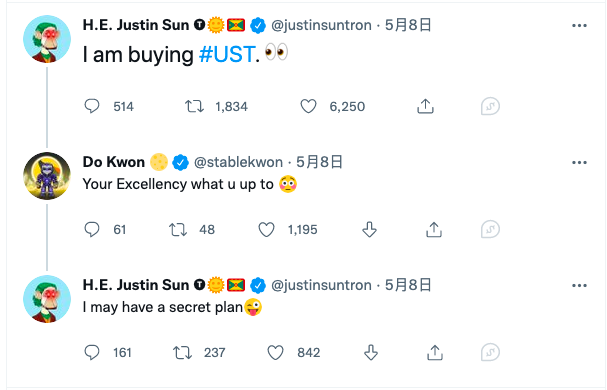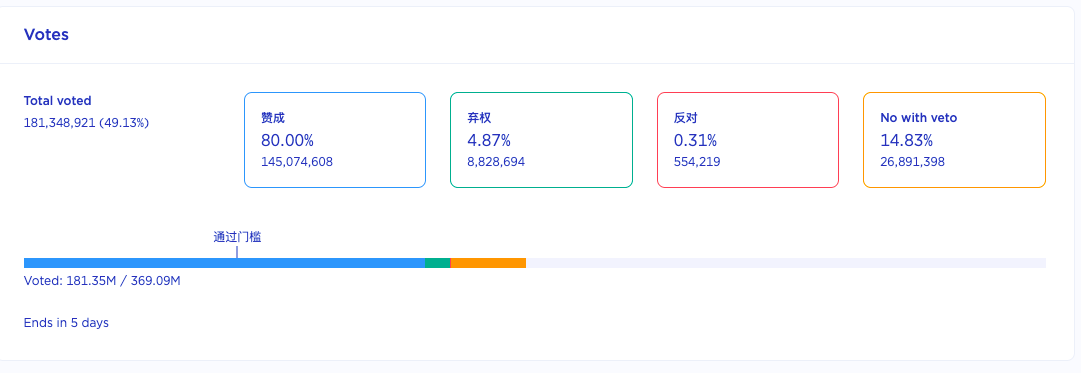Institutions hit hard by Luna thunderstorm
Author | Qin Xiaofeng
Produced | Odaily

Author | Qin Xiaofeng
Produced | Odaily

In the past two weeks, Terra (LUNA) and UST have suffered epic crashes, and their market value has evaporated by more than 50 billion US dollars, which has attracted the attention of the market. Not only did retail investors suffer heavy losses, but many mainstream institutions and crypto celebrities also suffered heavy losses.
On May 8th, Tron founder Justin Sun sent a message to Terra founder Do Kwon, saying that he was buying UST at the bottom, and that a big news was brewing - using UST and Tron stablecoin USDD to form a liquidity pool to increase USDD trading scenarios.
Sun Yuchen, who has always been shrewd, did not expect that the collapse of UST was so violent, and the price of UST broke down again just two days later; calculated based on the purchase price of US$0.99 on May 8, the UST he purchased has fallen by more than 90% .
Of course, the story of "buying bottoms and being buried" has become common recently. In addition, institutions that have long supported the Luna ecology and UST have suffered heavy losses, including Binance, Quantitative Agency Jump Crypto, Korean venture capital Hashed, Sanjian Capital and other dozens of investment institutions and encryption projects.
1. Floating losses of institutions and heavy lossesAfter Terra’s thunderstorm, Binance founder Changpeng Zhao (CZ) spoke several times on Twitter, making suggestions on community compensation plans and expressing anger at Terra’s inaction. Since the Terra team did not immediately propose an effective solution, Binance took the lead in suspending the transactions of UST and LUNA on the platform, and then reopened it.According to Zhao Changpeng’s tweet, Binance Labs, an investment arm of Binance, invested US$3 million in Terra in 2018 and obtained 15 million LUNA tokens (private placement price of US$0.2), and did not participate in subsequent financing. These 15 million tokens have since remained in
the address
(Click to jump), it has never been moved or sold, and its peak value was close to 1.8 billion U.S. dollars (LUNA’s highest was 119 U.S. dollars); in addition, Binance also obtained 12 million USTs through pledges (not purchased), and these USTs were also obtained from Not sold or moved in.
At present, the total value of LUNA and UST in the Binance address is about 900,000 US dollars; according to the highest price estimate, the unrealized loss of Binance this time exceeds 1.8 billion US dollars; calculated based on the investment of 3 million US dollars in 2018, the accumulated floating losses in four years $2.1 million, a loss rate of 70%.
In addition to Binance, four well-known institutions known as "Terra's Four Guardians"-Jump, Sanjian, Hashed, and Delphi also suffered heavy losses in this plunge.Hashed Ventures, a veteran Korean venture capital institution, was one of Terra's early supporters. It has publicly touted the advanced nature of Terra's technology many times, and participated in Terra's 2021 venture capital investment, helping to raise $25 million.Hashed Ventures has repeatedly stated that it is "financially sound" and has not been affected by the crisis.
But the data on the chain
It shows that the company has pledged more than 27 million LUNAs on the Columbus 3 main network, 9.7 million LUNAs on the Columbus 4 main network, and 13.2 million LUNAs on the current Columbus 5 main network; calculated according to the high price of LUNA , Hashed's paper losses totaled more than $3.5 billion.
The loss situation of several other institutions is not yet clear, but there are also traces through LFG (LUNA Foundation Guard).
In February of this year, in order to alleviate the debt pressure brought about by rapid growth, Terraform Labs established LFG to support UST pegged, successfully financing one billion US dollars, led by Jump Capital and Three Arrows Capital (Three Arrows Capital), Republic Capital, GSR, Tribe Capital, DeFiance Capital and others participated in the investment.
LFG publicly purchased BTC worth nearly 3 billion U.S. dollars. In this plunge, the LFG account used Bitcoin reserves to rescue the market. Currently, the remaining funds in the account are about 200 million U.S. dollars, and the loss rate of participating institutions is as high as 90%.
According to The Block data, when UST was de-anchored, the Jump Crypto layer tried to stabilize the price, and used three addresses on Ethereum to add more than $682.5 million in other USD stable currency liquidity to the liquidity pool on Curve, and finally passed LP tokens only withdrew the liquidity of nearly 600 million (593 million) UST, and lost nearly 100 million US dollars. After that, Jump Crypto minted UST as LUNA and tried to stabilize UST price but failed. In the end, Jump Crypto lost hundreds of millions of dollars.
Delphi Ventures directly disclosed in the official blog: participated in LFG financing in February 2022, Delphi Ventures invested 10 million US dollars, and did not sell any LUNA during the Terra crisis; loss.
In addition, Delphi Ventures stated that it had purchased a small amount of LUNA tokens (0.5% of the net asset value) in the secondary market in the first quarter of 2021; At one point it accounted for around 13% of Delphi Ventures' net worth. Of course, these assets are currently in a state of huge floating losses.
The above-mentioned institutions are basically long-term ecological supporters of Terra. Although they have suffered heavy book losses at a relatively high level, the cost of holding positions as early investors is low after all, and many institutions have died due to "buying against the market".
On May 10, UST once plummeted to $0.6, and a digital fund called Arca began to buy bottoms. Founded by Wisdom Tree co-founder Ryan Steinberg, the firm has $500 million in assets under management. After the day's plunge, Arca sent a letter to its LPs, making it clear that the firm would double down on UST. “We believe UST will eventually stay pegged and now we can buy UST at a discount and deposit into FTX for 100% APY (annual yield).”
However, the price of UST has continued to plummet since then, falling as low as $0.03. It was rumored that Arca was insolvent and facing bankruptcy. A spokesman for the company later said the company was fully solvent and continued to operate despite heavy losses.
2. A fire broke out at the gate of the city, which brought disaster to the fish in the pond
With the de-anchoring of UST and the chain reaction of LUNA plummeting, many related projects were also affected and suffered heavy losses.
On May 13, Kava Network's native decentralized stablecoin USDX was unanchored, and the price once plummeted to $0.65. The main reason is that part of the collateral of USDX is UST. Subsequent Kava will also remove UST from the collateral, and plans to remove UST and LUNA liquidity pool from Kava Swap.
On the same day, the lending agreement Venus Protocol issued a statement stating that Chainlink suspended the update of the LUNA price after the extreme fluctuation of the LUNA price, which resulted in the price of LUNA on the Venus lending market remaining at $0.107, while the market price had dropped to 0.01 US dollars, some users took the opportunity to arbitrage, which eventually led to a loss of about 11.2 million US dollars in the agreement. As a result, Venus Venture Fund took the loss and planned to vote to delist LUNA and UST from the market.In order to prevent the Venus Protocol incident from repeating the same mistakes, the Curve community recently proposed to remove the UST pool from Gauges and no longer provide liquidity incentives to it. Uneven distribution of profits etc.In addition, according to
Foreign media
According to reports, a revenue-generating app called Stablegains once promised users a 15% annual interest rate (denominated in USD). But without informing users, Stablegains put all the money into Anchor (annualized income of more than 20%), trying to earn the price difference. With the price of UST plummeting, Stablegains couldn't afford to withdraw all their funds, which ended up costing 4,878 customers over $40 million. Stablegains has since changed the denomination from USD to UST in its app and deleted the old terms in an attempt to get away with it, but was eventually exposed by users and is currently facing a class action lawsuit.
As the price of UST plummeted, the DeFi insurance project InsurAce Protocol played its role.
InsurAce will provide insurance support for the Terra ecology starting in July 2021; for this UST unanchored, the trigger point for insurance claims is that the 10-day average price of UST falls below 0.88 USD. On May 13, the insurance claim was officially triggered, and InsurAce put forward a detailed claim settlement plan and posted it on social media and blogs; users who purchased the insurance product, if the policy is still valid, can submit a claim application through the platform , InsurAce will propose a community voting proposal after the acceptance is completed, and handle subsequent claims in a unified manner.
In a blog post, the InsurAce Protocol project stated, “We expect to pay around $22 million (compensation) if the UST goes to zero. Our latest estimates, after talking to some policyholders, suggest that this lower total is about $15 million. We have about $50 million TVL and over $2 million in revenue, plus reserve capital. So we have enough capital even with $0 UST."
3. Successfully escaped to the top and stabilized the morale of the armyOf course, there are also some institutions that smelled the danger early, reduced their positions in advance, and successfully escaped the top. After the thunderstorm on Terra, in order to stabilize the morale of the army and give LP an explanation, they also issued notices one after another to clear the relationship.On May 8, the price of LUNA fell to 65 USDT, and the price of UST briefly decoupled for the first time, triggering
Ouyi OKXPeter Wall The risk control system then starts the automatic redemption mechanism to redeem all the user's assets from the chain for distribution, and gives risk reminders through APP, email, and Twitter. According to official data, tens of thousands of users were involved in this round. When the redemption arrived, the price of UST was 0.996 USDT, which successfully avoided losses for users.
CEO of Bitcoin mining company Argo BlockchainJoey KrugAlso stated in the first quarter earnings call: "We do have some UST, but our investment in the Terra ecosystem is not large. Before the UST completely collapsed, Argo sold it at a price of $0.93 each. Overall In general, our position in the Terra ecosystem has almost broken even after taking into account the gains we've generated through our holdings."
In addition, Pantera Capital, which has made two investments in Terraform Labs, also stated that it has already cashed out. its chief investment officer
The firm said it liquidated nearly 80% of its LUNA investment long before UST's crash last week, though it did not disclose specific figures.
On May 12, the CEOs, co-founders and investors of Dragonfly Capital, Multicoin Capital, Framework Ventures and others took to Twitter to assure the market that they did not hold or invest in UST and LUNA. In addition, 6th Man Ventures investor Mike DAOdas, encrypted salary payment project OnJuno, NFT project ByWassies, and collector organization FingerprintsDAO also announced on Twitter that they do not hold relevant assets. Crypto investment firm Arrington Capital also removed content from its website related to its $100 million Anchor Income Fund.
Galaxy Digital, which has long been a high-profile supporter of Luna, has also attracted attention recently. The company disclosed its liquidity, capital and operating performance, which showed that no algorithmic stablecoins were used in its reserves. You must know that Mike Novogratz, the founder and CEO of Galaxy Digital, has always been the number one fanatic fan of LUNA, and was even ridiculed by the whole network for his tattoo on his arm.
In the latest open letter, Novogratz stated that this tattoo will continue to remind him that crypto venture capital needs to be humble, and he still agrees with UST's vision.
4. Subsequent progressDo Kwon On May 14, Do Kwon, the founder of Terra, claimed in the media that no LUNA and UST were sold during the crash, and apologized to the victims of the incident, and said that he was looking for a way to rebuild.However, such rhetoric obviously cannot satisfy investors who have suffered heavy losses. In addition, related negative news about Terra has been exposed one after another:Disbanded Terraform Labs before LUNA and UST collapsed;Terraform Labs Internal Legal TeamLFG’s self-rescue is full of doubts, 80,000 BTC are spent on the back of the knife
according to... All kinds of problems made Do Kwon lose faith in the community. Victims have begun to sue Terra and its founders in Singapore (where LFG is registered) and South Korea (where Terra Labs is registered).according to
Reddit usersIt was revealed that a Singaporean resident has reported to the Singapore police. According to the report, as far as he knows, at least 1,000 Singaporeans have bought UST and LUNA and suffered losses. He also accused Terra of being a scam and asked the police to investigate its founder, Do Kwon.
South Korea's "Cultural Daily"

According to reports, South Korean investors decided to sue Do Kwon to the Seoul Metropolitan Police Agency on suspicion of fraud. Law firm LKB & Partners is also planning to apply for temporary seizure of Do Kwon's property and file a lawsuit against Do Kwon on charges of fraud. It is reported that six lawyers from the law firm's capital market legal team and intellectual property team are writing and reviewing the application for temporary seizure of property and the complaint against the CEO.
In addition, South Korea's joint investigation team for financial and securities crimes officially launched an investigation into Terra, including Do Kwon and other core members of the team. Terra is the first investigation to be launched after the reorganization of the Korea Financial Securities Crime Joint Investigation Team, which is composed of members from different financial regulators and aims to prosecute securities fraud and unfair transactions.



